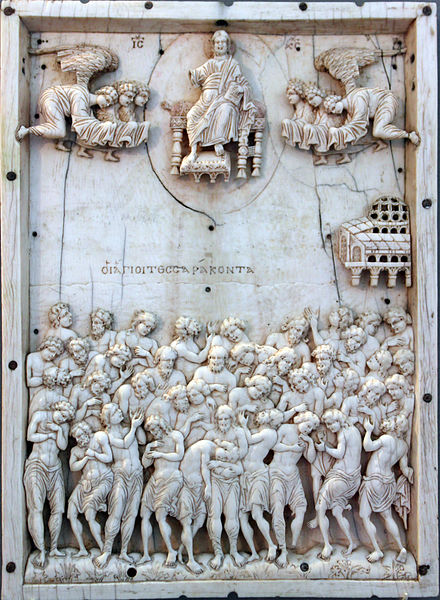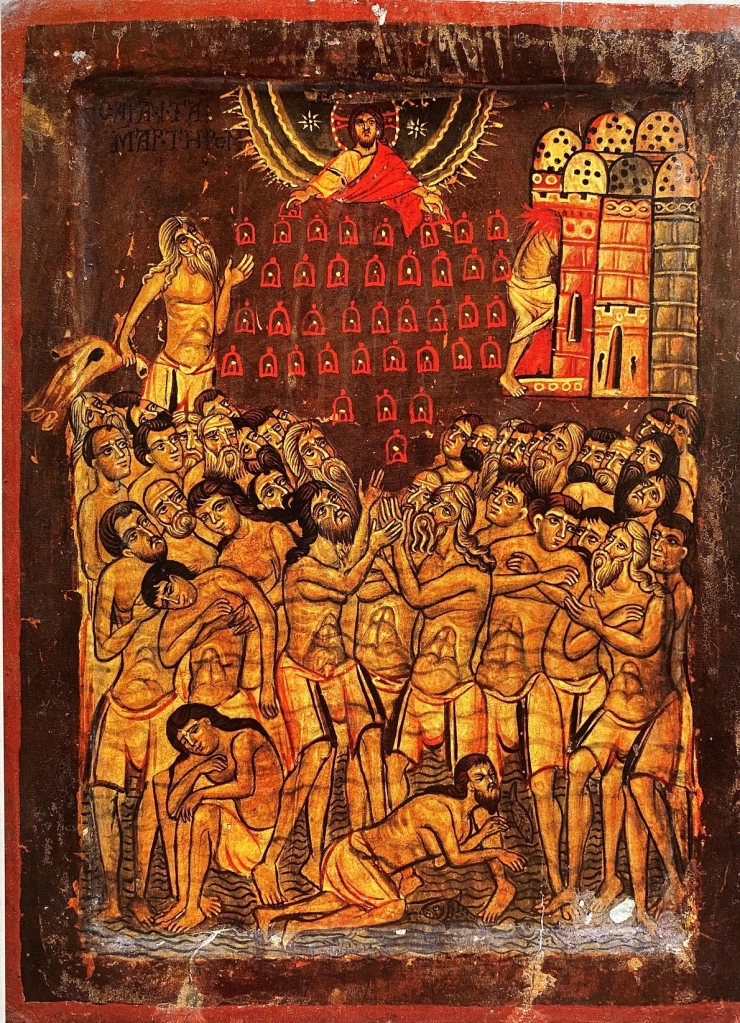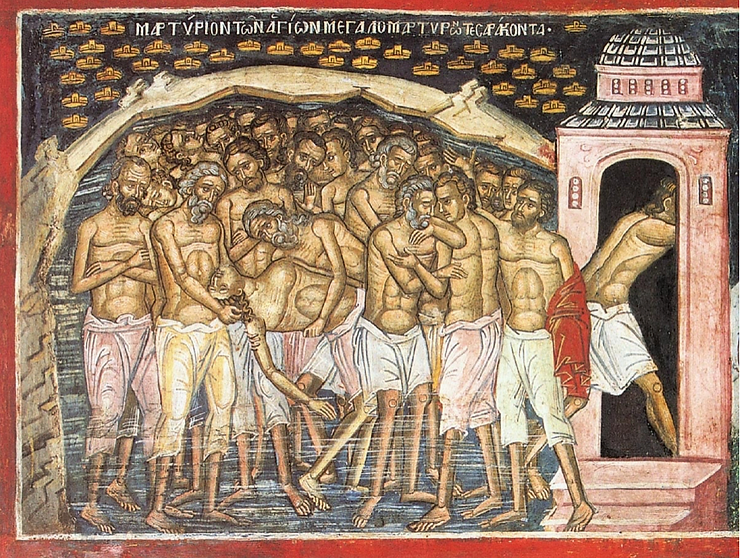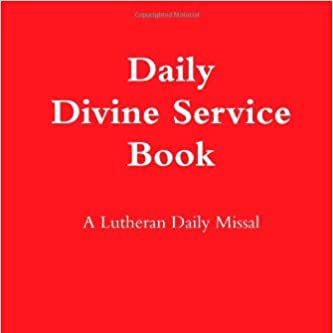“Winter is Harsh, But Paradise is Sweet”

The tale of the Forty Martyrs of Sebaste, commemorated on March 9th, could very well be one of those sanctoral stories with which you are not familiar. In fact, the Forty Martyrs of Sebaste, also known as the Forty Knights, don’t find themselves as part of our usual modern-day Lutheran sanctoral cycle. While they were once quite popular and thoroughly celebrated as part of the Church Year, including by Lutherans, their rekniwn has experienced somewhat of a decline. Sadly, many in the Church today are not familiar with their incredible story.
Their story starts around the year AD 313, when St. Constantine the Great issued an edict that granted Christians religious freedom and officially recognized Christianity as a viable religion under the law. However, just a few years later, in AD 320, the Emperor of the eastern Roman Empire, Lucinius, ordered that every Christian in his kingdom renounce his faith or face death. Lucinius, while originally a supporter of Christianity along with Constantine, later turned to paganism and initiated various forms of persecution against the Christians. This edict was one of them, and it had great effects on his people. Lucinius was said to have passed this decree in part because he feared that the Christian soldiers in his army would attempt mutiny when he later decided to fight Constantine.
With the announcement, forty soldiers of different nationalities who were part of his famous “Thundering Legion” were said to have refused to comply with this order. They were notable men of great loyalty and dedication to their jobs. The legion received its nickname from Marcus Aurelius and were well known around the entire Christian world. The fact that they refused to obey their Emperor was a big deal, and they were brought to military trial in Sebaste, in modern day Armenia.
To truly test their faith and make a statement, the governor in charge of them ordered that they be forced to stand on a frozen lake, naked and exposed to the elements until they either changed their minds or froze to death. In a great confession of faith, the forty soldiers didn’t even wait to be stripped but instead undressed themselves, completely ready to face their fate, praying all the while and even writing a will, expressing their faith, unity, and courage. A fire and warm baths were prepared on the side of the lake in case they surrendered, but for three days and nights most of them held fast.
During this time, one young soldier left the group, giving up his crown. Despite his apostasy, by which he intended to save his life, it’s recorded that the warmth of the bath and its shock to his system killed him. Yet even his sin encouraged someone to come to the faith. One of the guards, Aglaius, who witnessed this act and who had watched over the men during the entirety of the event was converted. Aglaius laid down his weapons and stripped, proclaiming himself a Christian, and walked out on the ice to join the group, bringing the number of martyrs back to forty. According to tradition as these 40 men continued to suffer on the freezing lake, they strengthened themselves and one another by saying “Winter is harsh, but paradise is sweet!”
By the fourth morning, most of the men had died, and the remaining were killed. All the bodies were burned in a furnace, as cremation was the sign of the pagan Romans, and their ashes were thrown in a river. Christians tried to recover what they could of the bodies to give them a proper Christian burial.
A Brief History
If you are wondering how we know the details of this incredible confession, the amazing story comes to us recorded by the family of St. Basil the Great. Church tradition tells us that his parents and siblings were among those who first knew about the martyrdom of these men and helped gather their remains after they were cremated and scattered. St. Basil then went on to preach a sermon in AD 373 in honor of their feast day, the first written record of their courageous story. The church that he preached in, in present-day Caesarea, is dedicated and named in honor of them.

About the men, St. Basil declared “O holy chorus! O hallowed battalion! O unbroken fighting order! O common guards of the human race! Good companions in times of anxiety, helpers in prayer, most powerful ambassadors’ stars of the world, flowers of the church!”
Likewise, St. Gregory of Nyssa (who was St. Basils’ brother, learn more here) is also said to have been greatly influenced by the story. When their parents died, St. Gregory had their remains buried beside some of the martyred soldiers’ Christian graves. In his lifetime, St. Gregory also preached at least twice on the Forty Martyrs.
Finally, visual depictions of the Forty have long been some of the most well known artistic representations of saints in general from the time of their martyrdoms until the present day. With some representations dating as far back as the 400s and 600s, artistic renderings of the saints can be seen in churches in Rome and Sicily, to name a couple places. Seen standing together in a naked mob with one entering the bathhouse and Aglaius shedding his clothes to join the rest, they not only remind Christians of the story of their brilliant confession but also encourage reflection upon all Christian martyrs, past and present, whose willing and faithful martyrdoms confess the death and resurrection of Jesus Christ on their lips, through their bodies, and in their lives.

Collect
O God, by Whose grace, we are celebrating the heavenly birthday of Thy Holy Martyrs: grant that we may rejoice in their companionship in everlasting bliss; through Jesus Christ our Lord, who liveth and reigneth with Thee and the Holy Ghost, ever one God, world without end. Amen.
Lessons
Resources
Propers found in Daily Divine Service Book: A Lutheran Daily Missal, edited by the Rev. Heath Curtis
References:
1. The Rev. Steven Hokana. “40 Brave Soldiers.” LCMS Ministry to the Armed Forces Newsletter.
Images:
1. Relief plaque with the Forty Martyrs of Sebaste, Unknown, Turkey, ~10 Century.
2. The Forty Martyrs of Sebaste, Unknown, Georgia, 13th Century.
3. Forty Martyrs of Sebaste, Unknown, Greece, Unknown.



I never knew of the 40 martyrs until now. What an incredible confession of the Christian Faith! “Winter is harsh, but paradise is sweet” is such a beautiful reminder for us today.
It truly is. And such a treasure even if their story is lesser-known today.